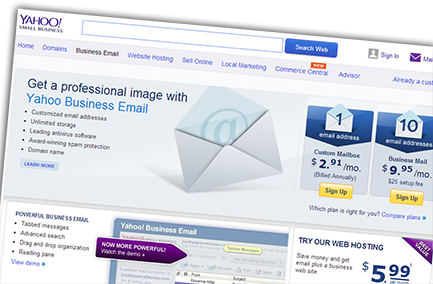Updated July 2017

When you think of email addresses, you probably think of the free email services like yahoo, gmail, and hotmail since that’s what most people use for email. Beyond that, the most common email addresses customers get with their home internet service providers like comcast.net and att.net. These types of email services are fine for personal email addresses but they should NOT be used for business email.
To understand why you should NOT use an @yahoo.com or @comcast.net email address for your business, read this post. For those who don’t want to click over to that post, I’ll summarize the post in one sentence. – Using an email address on a domain other than your own is not professional.
This post assumes you already have your domain name purchased. You need a domain name in order to host your email on YOUR domain rather than shared domains like yahoo.com or comcast.net for example.
After you have your domain name, you need email hosting to setup email addresses. Email hosting is the physical location where your email is stored and the applications are run to send and receive mail. This is where it gets a little tricky and you can end up overpaying for services you don’t need. Here are two affordable and appropriate ways to get small business email set up.
- Many domain name registrars include a single email address. Check with your registrar where your domain is managed to see if you have free email hosting with your domain. In the past, Godaddy provided 1 free email address with all domain names but stopped in 2013 and now charges a few dollars a month for one email address through a partnership with Office 365 by Microsoft. It seems most domain registrars will follow in Godaddy’s footsteps and eliminate free email hosting, but it’s worth checking if email is included with your domain before purchasing elsewhere.
- There are few email hosting companies out there that provide a free option. One of those I stumbled on lately is Zoho Mail. They have been growing in popularity due to their free email hosting that offers valuable features. You can check out my post on Zoho Mail that includes a video on the setup process and features included with Zoho Mail. In the post, I compare Zoho Mail to Google’s email offering for business called G Suite.
- If you are buying or already purchased website hosting to create a website for your business, email addresses are probably included in the price of your hosting. You shouldn’t need to purchase email hosting separately unless you have specific needs for your email service like a large number of email addresses, tons of storage, or better spam protection. Often the email client is not as good as what you would get with Google G Suite (gmail), Office 365, or Zoho Mail, but the setup will be super easy and it’s already included in what you’re paying for hosting. RoundCube is a popular email platform that is including with many costing platforms.
If you’re looking for an affordable web host with email included as described in #3 above, check out HostGator. I’ve had an account with them for over 15 years. Hostgator includes unlimited email addresses even on their cheapest plans. So with a Hostgator website hosting plan, you’ll be getting website and email hosting in one plan. You can use the coupon code “WEBEMINENCE” to get a deeper discount too when ordering on the Hostgator website. If you sign up through my link, I’ll be happy to help you get your email setup.
SMALL BUSINESS MISTAKE! – One common mistake small businesses make is wasting money on separate email hosting service when already paying for it elsewhere. Some businesses need dedicated email hosting for special functions like using an Exchange server or spam filtering, but basic email service is more than enough for most small businesses. So before you spend money on email hosting, see if one of the options above will cover your email needs.
 When I wrote this post in 2013, Yahoo email hosting for small businesses was one of the most popular services for email. And it wasn’t really because it was a great option, but more because it comes up #1 in search engines when people search for “small business email.”
When I wrote this post in 2013, Yahoo email hosting for small businesses was one of the most popular services for email. And it wasn’t really because it was a great option, but more because it comes up #1 in search engines when people search for “small business email.”
It seems that customers took notice and, as I had written in 2013, Yahoo email hosting for small business was not a great value for the money. Yahoo has updated their email offering, but it’s no longer in the top spots for Google searches for “small business email” and they don’t even rank #1 on their own search engine. It’s outranked by Google’s G Suite option and Rackspace in many cases.
Google’s free email service hosted on Gmail has grown in popularity and had over a billion users as of 2016. They extended the popularity of their gmail.com email addressed to allow businesses to host email on their own domain but use the Gmail interface that over a billion people are already accustomed to. It was Google Apps for Work but how long could they really stick with that crazy name. The name was changed to G Suite in 2016 and for $5/mo a single user gets an email address and access to storage for other Google apps like Docs, Sheets.
I use Google G Suite for my email on webeminence.com for the last few years. I did use email included with my website hosting (as described in #3 above) but after a while the spam filtering was becoming an issue first on my desktop (I was able to solve this problem) then on my smart phone. Google probably has some of the best spam filtering technology in the world and so it was worth the $50/year per email address to get it off my plate!
I also recommend G Suite to my own clients looking for professional email and I’m a G Suite partner. So if you’re interested in setting up your domain email on G Suite, contact me an I may be able to hook you up with a 20% off discount for your first year!
 Many business owners will run into Office 365 when searching for email options. Office 365 offers Microsoft Exchange hosted email which is a popular and reliable service. It’s about more than email though. Subscriptions to Office 365 include access to other tools and Microsoft Office Software. All in all, it’s a reliable email service from a name that most of us trust. It’s comparable in price to many email hosting options. Read more of the details and see my video on Office 365.
Many business owners will run into Office 365 when searching for email options. Office 365 offers Microsoft Exchange hosted email which is a popular and reliable service. It’s about more than email though. Subscriptions to Office 365 include access to other tools and Microsoft Office Software. All in all, it’s a reliable email service from a name that most of us trust. It’s comparable in price to many email hosting options. Read more of the details and see my video on Office 365.
Email Viewing Options
 After you have your email hosting setup, the most common question is – “How do I access my email?”
After you have your email hosting setup, the most common question is – “How do I access my email?”
Most email hosts provide their own email applications for accessing your email on desktop, web browsers, and on your smart phone. Here are the 2 common methods for accessing your mail.
- POP IMAP Mail Servers – Your email host will provide you with mail servers and a username and password to access your mail from any email client. An email client allows you to input this information and login to your email account to send, receive, and manage email. Email clients include Microsoft Outlook, Windows Live Mail, Thunderbird, Mac Mail, and many others. You can use this same information to setup your business email accounts on your phone or within your personal email account like Gmail or Yahoo. This will allow you to access your personal and business mail in one place (if you’re that kind of person ;)).
- Webmail Access – Email hosts will also give you access to webmail. This is a URL on your website, usually www.yourwebsite.com/webmail, where you can login to read your mail. It may not have as many features as your email client, but the beautiful thing about webmail is you can access it from anywhere you have an internet connection. If you’re using Gmail or Zoho Mail for example, you have access to their mail app interface in a browser and on your phone.
So What’s Your Email Preference?…
Which email client you use depends on your preference and email lifestyle. I currently use Gmail for personal email and I use Thunderbird to manage my G Suite mail on my desktop and the Gmail app on my Android phone. What do you use and why?
If you have questions about your own email setup or just want to post what you use for email, please take a second to post a comment or question below.
